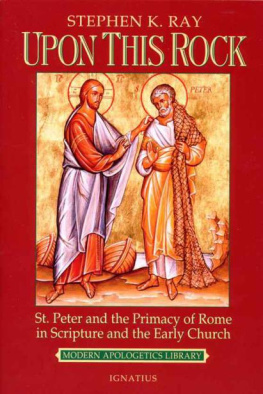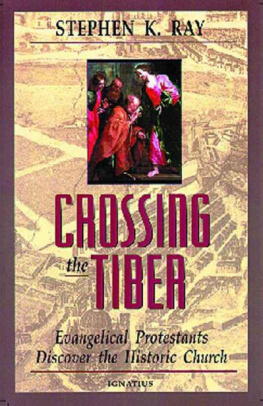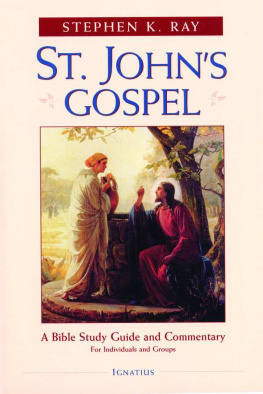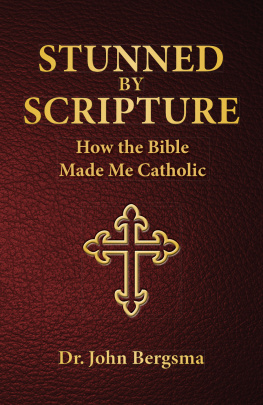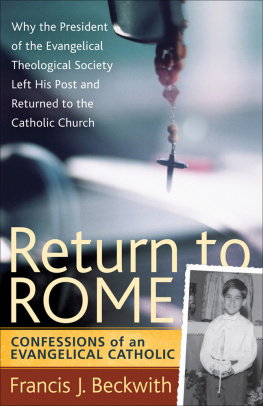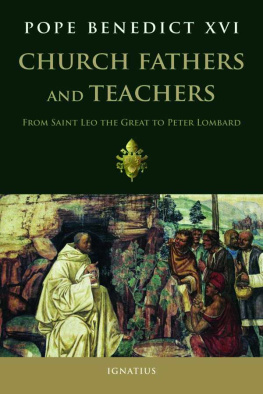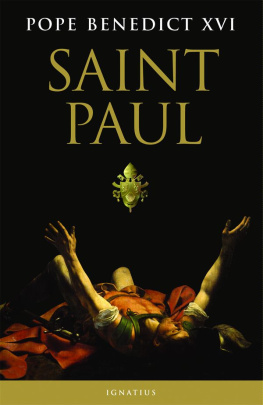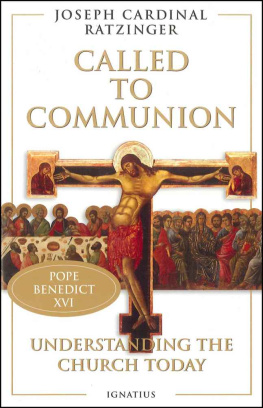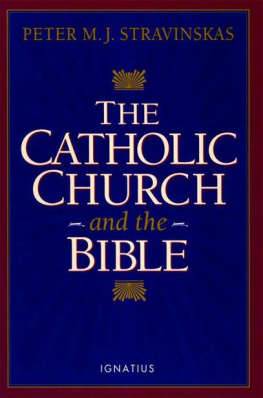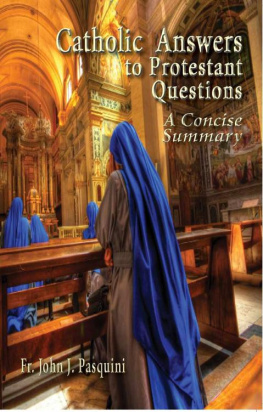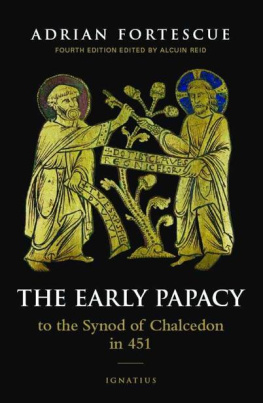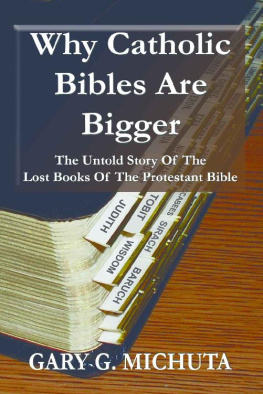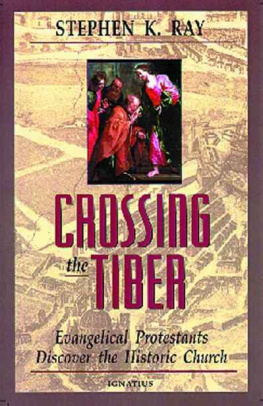UPON THIS ROCK
MODERN APOLOGETICS LIBRARY
UPON THIS ROCK
St. Peter and the Primacy of Rome in Scripture and the Early Church
BY
STEPHEN K. RAY
IGNATIUS PRESS SAN FRANCISCO
Nihil Obstat: Reverend Robert Lunsford
Censor Librorum
Imprimatur: + Carl F. Mengeling
Bishop of Lansing
Cover art: Icon written by Brother Claude Lane, O.S.B.
Mount Angel Abbey, Oregon
Cover design by Riz Boncan Marsella
1999 Ignatius Press, San Francisco
All rights reserved
ISBN 978-0-89870-723-6
Library of Congress catalogue card number 98-74065
Printed in the United States of America
DEDICATION
To Thomas Howard, who courageously journeyed beyond the boundaries of his Fundamentalist Protestant roots to discover the glory of the Catholic Church and, in so doing, broke through a hidden barrier, opening the door for thousands of orphaned souls to glimpse the light. But even more than that, he wrote Evangelical Is Not Enough and, in so doing, made it possible for me, my family, and countless friends and fellow Evangelicals to find the Catholic Church, which, from our birth, had been darkly shrouded by grotesque caricatures and misinformation. His life and pages have enabled us to embark on a great love affair with the ancient Church, which we have found to be forever young. For this great treasure, we owe an eternal debt of gratitude.
To Fr. Ed Fride, the first Catholic priest our family ever knew and the one who baptized our children, confirmed all six of us, and received us with tears of joy into the Roman Catholic Church. In the subsequent years he has been a stalwart model of godliness, strength, faithfulness, and orthodoxy. He has become a great friend, and we have adopted him into our family (with a special ceremony and certificate). We admire his dedication to holiness, the Lord Jesus, the Catholic Church, and the See of Rome. We are honored to follow such a shepherd, who daily lays down his life for the sheep and serves in the sure line of the apostolic succession.
To Dave Palm, another Evangelical Protestant who came into the Catholic Church about the same time as our family and who has been a friend extraordinaire. He has a degree in New Testament studies and is thoroughly acquainted with the issues surrounding the Papacy, as well as with all other matters Catholic. But most of all, he has a contagious love for Jesus and the Church. He graciously critiqued my manuscript. Blessed be God forever for such brothers in our Lord Jesus Christ.
And finally, to Bishop Carl Mengeling, bishop of Lansing, Michigan, who read the entire manuscript and offered many helpful suggestions, as well as his Imprimatur. I am honored to have such a faithful shepherd.
Most of the biographical information on the Fathers used in the footnotes was gleaned from two excellent sources: The Oxford Dictionary of the Christian Church, edited by F. L. Cross and E. A. Livingstone, 2d rev. ed. (New York: Oxford Univ. Press, 1983), and The Faith of the Early Fathers, in three volumes, by William A. Jurgens (Collegeville, Minn.: Liturgical Press, 1970). Christendom Press was kind enough to grant permission for use of the chronology of St. Peters life from their book The Founding of Christendom, by Warren H. Carroll. Our Sunday Visitor, Inc., graciously granted permission to use the chronological list of Popes that is reprinted in Appendix A.
[Andrew] brought [Simon] to Jesus. Jesus looked at him, and said, So you are Simon the son of John? You shall be called Cephas (which means Peter).
John 1:42
When Christ at a symbolic moment was establishing His great society, He chose for its cornerstone neither the brilliant Paul nor the mystic John, but a shuffler, a snob, a cowardin a word, a man. And upon this rock He has built His Church, and the gates of Hell have not prevailed against it. All the empires and the kingdoms have failed, because of this inherent and continual weakness, that they were founded by strong men and upon strong men. But this one thing, the historic Christian Church, was founded on a weak man, and for that reason it is indestructible. For no chain is stronger than its weakest link.
G. K. Chesterton, in Heretics
My grace is sufficient for you, for my power is made perfect in weakness.
2 Corinthians 12:9
CONTENTS
INTRODUCTION
St. Peter and the Primacy of Rome
There is little in the history of the Church that has been more heatedly contested than the primacy of Peter and the See of Rome. History is replete with examples of authority spurned, and the history of the Church is no different. As we proceed with this overview of history, we will allow the Scriptures, the voice of the apostles, and the testimony of the early centuries of the Christian community to speak for themselves. In many quarters, over the last few centuries, the din of opposition and uninformed dissent has drowned out the voices of these ancient witnesses. Novel ideas, like a voracious flood, have tried to erode the foundations and the clear historical precedents provided by the Holy Spirits work in the primitive Church.
History has a clear and distinct voice, but it does not force itself upon us uninvited. History is prudent and waits quietly to be discovered. Conversely, the ingenious inventions of recent theologians and innovators are loud and demanding, bursting upon our ears and minds, our lives and hearts, demanding our immediate attention and loyalties. The riches of history fall quietly aside as the prattling innovators blast their trumpets and loudly parade their followers through new streets, trampling the knowledge of the ages under their cumulative feet.
Here we will allow the voices of the past to speak againfor themselves. And what the reader will find is that the utterances of the past still resound with one voice, with clarity and force. To study those who have gone before us, following in the footsteps of the Lord Jesus, his apostles, and our Fathers in the faith is to lose interest in much of the clamor of modern notions. We find these theological innovations and ecclesiastical groups poorly devised, if not disingenuous. This is what John Henry Newman, a Protestant clergyman at the time, found as he studied the primitive Church. He concluded: To be deep in history is to cease being a Protestant. As the Protestant churches continue to fragment and lose the fervor and orthodoxy of their past reform efforts, many Evangelicals and Fundamentalists are looking to the past to hear what the early Fathers have to say today. They are beginning to listen to the unobtrusive voice of the early Church, and they are finding it is quite different from what they have been taught. Reading the writings of the early Church allows us to tap into the very heartbeat of the apostolic teaching and tradition of the primitive Churchthe very Church bequeathed to us by the apostles.
Sometimes silence is more eloquent than words. This is especially true in Church history. We hear so much about what the Fathers say and so little about what they do not say. This is revealing and should play a significant role in our research. William Webster has written a book that we will refer to several times in our study. Webster is an ex-Catholic who decided to abandon the Church and cast his lot with the Fundamentalist Protestants. His book is entitled Peter and the Rock and asserts that, as the blurb on the back of the book says, The contemporary Roman Catholic interpretation [of Peter and the rock] had no place in the biblical understanding of the early church doctors. To ascertain whether or not such an assertion is true is one of the main goals of this book. But along with what the Fathers say, we need to hear their silence as well.
While reading Websters book, I noticed, along with his selective use of the Fathers in attempting to discredit the Catholic Churchs teaching on the Papacy, that there are no citations revealed in his book in which a Christian, especially a Church Father, explicitly denies the Petrine primacy or the Petrine succession. Webster collects a large number of passages that are supposed to prove that the Fathers oppose Catholic teaching, yet never is there a flat-out denial of the Petrine primacy or the primacy of Rome. This is a silence that speaks volumes! We may find differing interpretations of Peters primacy, which is what we should expect, according to John Henry Newman, yet we find no denial of that primacy.

